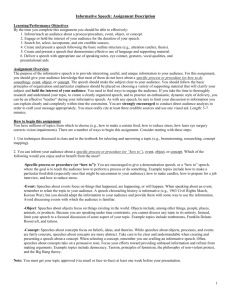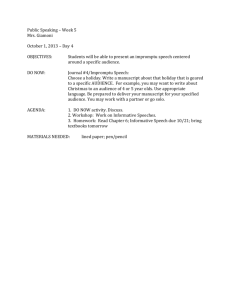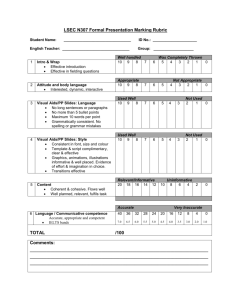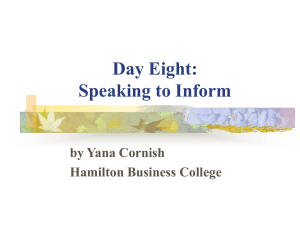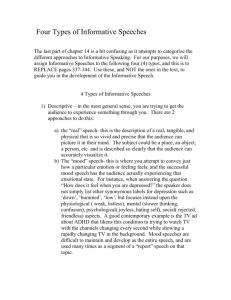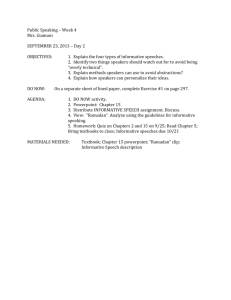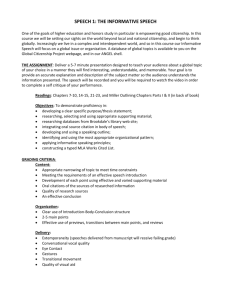The Informative Speech – Narrowing your Topic
advertisement
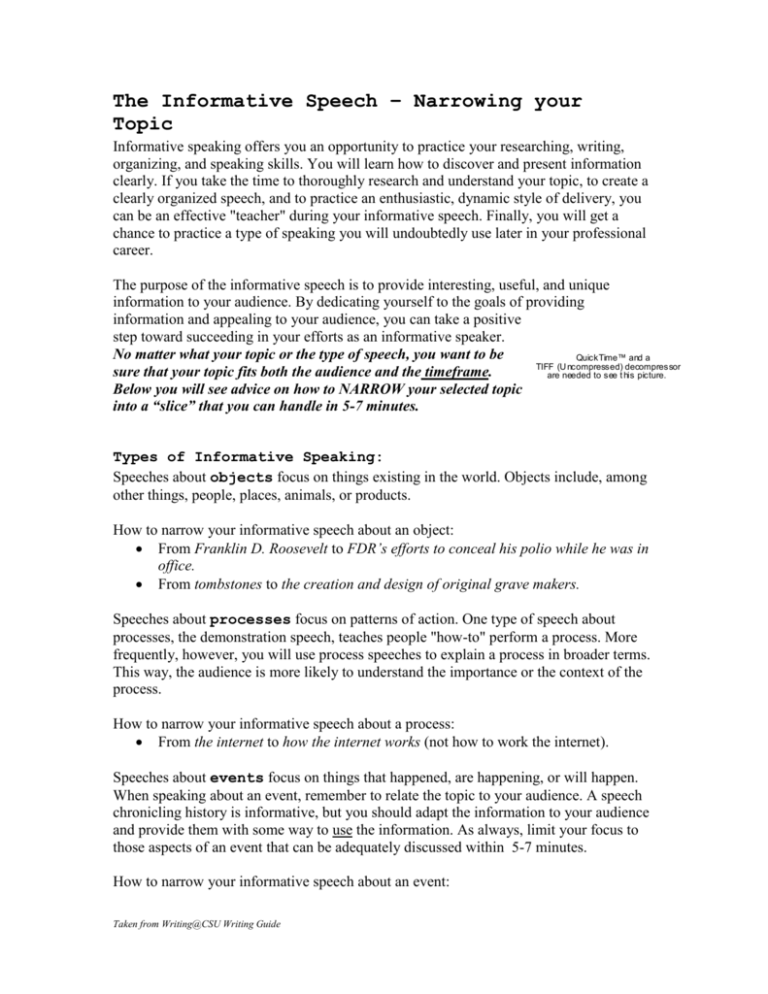
The Informative Speech – Narrowing your Topic Informative speaking offers you an opportunity to practice your researching, writing, organizing, and speaking skills. You will learn how to discover and present information clearly. If you take the time to thoroughly research and understand your topic, to create a clearly organized speech, and to practice an enthusiastic, dynamic style of delivery, you can be an effective "teacher" during your informative speech. Finally, you will get a chance to practice a type of speaking you will undoubtedly use later in your professional career. The purpose of the informative speech is to provide interesting, useful, and unique information to your audience. By dedicating yourself to the goals of providing information and appealing to your audience, you can take a positive step toward succeeding in your efforts as an informative speaker. No matter what your topic or the type of speech, you want to be QuickTime™ and a TIFF (U ncompressed) decompressor sure that your topic fits both the audience and the timeframe. are needed to see t his picture. Below you will see advice on how to NARROW your selected topic into a “slice” that you can handle in 5-7 minutes. Types of Informative Speaking: Speeches about objects focus on things existing in the world. Objects include, among other things, people, places, animals, or products. How to narrow your informative speech about an object: From Franklin D. Roosevelt to FDR’s efforts to conceal his polio while he was in office. From tombstones to the creation and design of original grave makers. Speeches about processes focus on patterns of action. One type of speech about processes, the demonstration speech, teaches people "how-to" perform a process. More frequently, however, you will use process speeches to explain a process in broader terms. This way, the audience is more likely to understand the importance or the context of the process. How to narrow your informative speech about a process: From the internet to how the internet works (not how to work the internet). Speeches about events focus on things that happened, are happening, or will happen. When speaking about an event, remember to relate the topic to your audience. A speech chronicling history is informative, but you should adapt the information to your audience and provide them with some way to use the information. As always, limit your focus to those aspects of an event that can be adequately discussed within 5-7 minutes. How to narrow your informative speech about an event: Taken from Writing@CSU Writing Guide From holidays to the celebration of Ground Hog’s Day Speeches about concepts focus on beliefs, ideas, and theories. While speeches about objects, processes, and events are fairly concrete, speeches about concepts are more abstract. Take care to be clear and understandable when creating and presenting a speech about a concept. When selecting a concept, remember you are crafting an informative speech. Often, speeches about concepts take on a persuasive tone. Focus your efforts toward providing unbiased information and refrain from making arguments. Because concepts can be vague and involved, limit your speech to aspects that can be readily explained and understood within 5-7 minutes. How to narrow your informative speech about concepts: From politics to the impact of feminism on the constitution ANSWER THESE QUESTIONS THEN BRING THEM TO THE TEACHER SOMETIME TODAY FOR CHECK OFF: 1. NAME: ___________________________________________________________ ___ 2. WHAT TYPE OF SPEECH ARE YOU GIVING? IS IT ABOUT AN OBJECT, A PROCESS, AN EVENT, OR A CONCEPT? 3. WHAT’S YOUR BROAD TOPIC? i.e. music, cars _________________________ 4. WHAT ARE YOU THINKING OF NARROWING YOUR TOPIC DOWN TO? _______________________________ OR ___________________________________ OR MAYBE __________________________________________________________ Gathering Materials: Gathering materials can be a daunting task. You may want to do some research before you narrow your topic. Once you have a topic, you have many options for finding information. You can conduct interviews, write or call for information from a clearinghouse or public relations office, and consult books, magazines, journals, newspapers, television and radio programs, and government documents. There is much Taken from Writing@CSU Writing Guide more available to you other than the internet! The library will probably be your primary source of information. While researching, you may want to carry note cards. When you come across a useful passage, copy the source and the information onto the note card. You should maintain a working bibliography as you research so you always know which sources you have consulted and so the process of writing citations into the speech and creating the bibliography will be easier. GOOD LUCK and GET BUSY RESEARCHING! Taken from Writing@CSU Writing Guide


